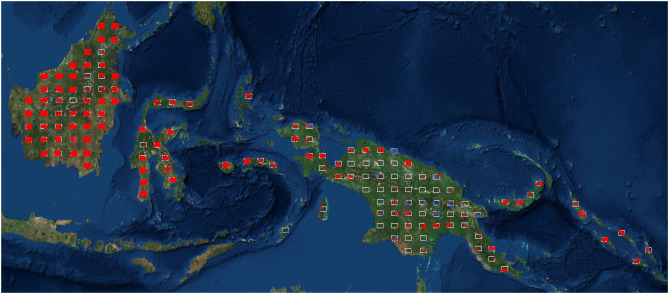The Indo-Malaysian region harbors some of the highest diversity globally, yet it is also has the highest rates of deforestation. Large-scale forest clearance is preceded by the growth of road networks which provide a stark warning for the region's future as many of the roads established for clearance or infrastructure are illegal and unmapped.
Understanding where roads are, and what percentage are included in global datasets is important. Firstly, road data indicates the areas are most vulnerable to development in the near future and roads account for almost all deforestation. Furthermore, increasing numbers of global analysis are likely to make use of global datasets to assess threats to biodiversity and generate conservation priorities.
Dr. Alice Hughes of Xishuangbanna Tropical Botanical Garden (XTBG) mapped out the road data in Indo-Malaysian region. The results clearly showed that the uncontrolled expansion of roads across the Indo-Malaysian region is a major contributory factor behind regional forest loss.
The expansion of infrastructure has been so rapid that up to 99% of roads in parts of the region are not included in global road maps, meaning remaining forests are more fragmented and smaller than most estimates.
All forms of exploitation are greater close to roads, and when all roads are mapped the average distance to a road dropped to under one tenth of that using the global road maps for almost half of the region, making them vulnerable to hunting and all other forms of exploitation.
The continued expansion of road networks and plantations inevitably had devastating consequences for biodiversity across the region.
Dr. Alice Hughes proposed that urgent action is needed to protect key areas, to stem the rate of loss of high biodiversity value forests and to expand Indonesia’s moratorium to include high diversity rather than just primary forest.
The study entitled “Have Indo-Malaysian forests reached the end of the road?" has been published in Biological Conservation.
Contact
Alice C. Hughes Ph.D Principal Investigator
Centre for Integrative Conservation, Xishuangbanna Tropical Botanical Garden, Chinese Academy of Sciences, Menglun, Xishuangbanna, Yunnan 666303, China
E-mail: achughes@xtbg.ac.cn

Grids of roads across the Indo-Malaysian region .
Blue lines indicate roads mapped by OSM whereas red lines indicates roads mapped by Alice Hughes.
(Image by Alice Hughes)

